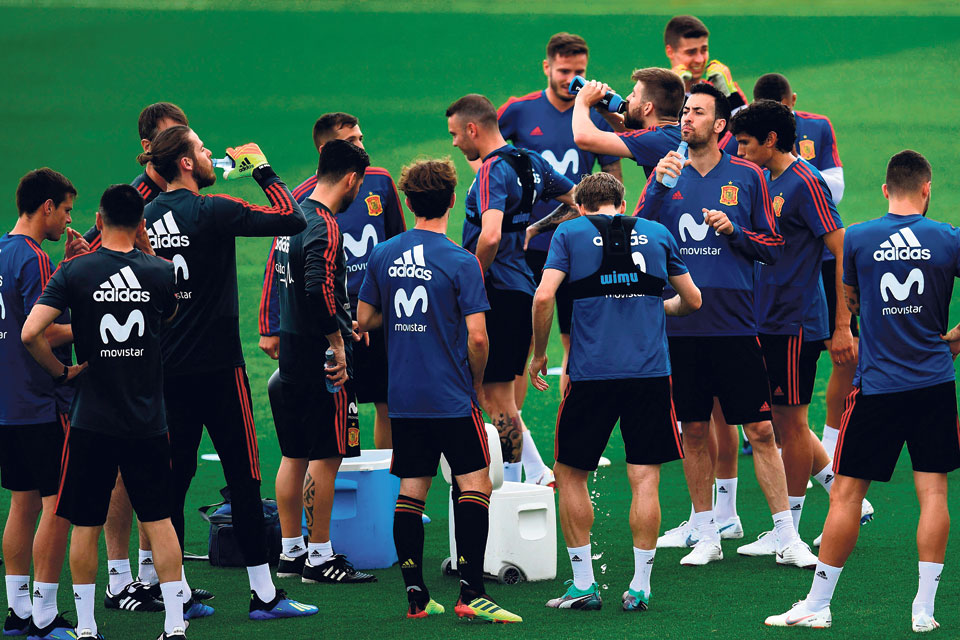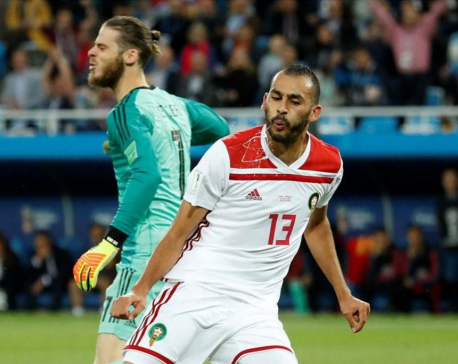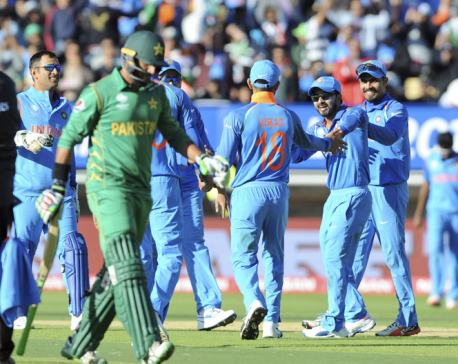
OR
Group B’s dark horses Iran, Morocco can upset European heavyweights
Published On: May 31, 2018 12:50 PM NPT By: ABHISHEK SUBEDI

KATHMANDU, May 31: European teams Spain and Portugal are the two teams who are in contention for the top spot in the Group B of the 2018 FIFA World Cup which is set to hit the ground running from June 14 and will be concluded on July 15.
But, the other team in the group, Asia’s Iran, who entered the football’s grand event as the winner of the Group A from the AFC qualification campaign winning six and drawing four matches out of the 10 games it played, is a top nut to crack and will surely be giving tough fights to both its European opponents.
Meanwhile, Africa’s Morocco, who is making its fifth appearance in the World Cup after 20 years, will boast its attacking pool of talented players and will be hoping to cause an upset or two.
Morocco and Iran will have the same number of World Cup appearances, come the month of June, and will be termed as ‘Dark horses’, furthermore putting their defenses into the test.
Spain
Introduction
Debating on the necessary attributes of Spain, a lot can be said at their recent failures in the Euro Cup 2016 and the 2014 FIFA World Cup in Brazil. Getting knocked out from the round of 16 by Italy in the Euro 2016, and suffering a disappointing group stage exit from the last World Cup, had led to the departure of the then head coach Vicente del Bosque after 2016, who led Spain to the 2010 World Cup 2010 and the Euro Cup 2012.
Since then, 51-year-old Julen Lopetegui has been taking charge of the team with 12 wins and four draws from the 16 matches he has been in charge of.
Spain topped the Group G of its UEFA qualifications winning nine out of 10 matches, drawing one and scoring 36 with only one conceded, Spain surely made its reputation grow nearing the World Cup along with a 6-1 humbling of Argentina in a friendly match on March 28.
‘Golden generation’
There was once a time when Spain had the likes of Xavis, Ikers, Puyols and Alonsos, but with that past generation flourished and seen the glory, it’s time for Spain to give authority to a new set of players which most notably includes Manchester United’s 27-year-old shot-stopper David de Gea, along with Real Madrid midfield duo Marco Asensio and Isco.
Also now playing for the country, there are former Barcelona midfielder Andres Iniesta, Manchester City’s veteran playmaker David Silva, and Real Madrid and Spain’s captain Sergio Ramos, probably making their last appearances in the World Cup.
Having won two Euros and a World Cup, the three players will most likely pave way for other four or more players in their respective positions. Barcelona duo, defensive midfielder Sergio Busquets and center back Gerard Pique, who won the 2010 World Cup and the Euro 2012, will also most likely see their international football coming to a close.
Now, the golden generation has goalkeeper De Gea, Chelsea center back Cesar Azpilicueta, Real Sociedad’s right back Alvaro Odriozola, along with the other right back Real Madrid’s Dani Carvajal, who suffered a hamstring injury in his side’s 3-1 win over Liverpool in the Champions League final on Saturday and is expected to be fit by Mid-June. He might be replaced by Sergi Roberto, but the official decision is still to be made.
Likewise, Spain has talented midfielders in Isco and Marco Asensio, Atletico Madrid’s Saul and Koke, along with Bayern’s Thiago Alcantara.
The forwards selected for the World Cup are not very young, but Real’s 26-year-old winger Lucas Vazquez and Valencia’s 27-year-old forward Rodrigo Moreno will surely add to the variety of ingredients Spain already has.
Top quality goalkeepers
De Gea was the man main to Lopetegui wanted to have between the sticks for Spain as his brilliant domestic performance of 18 clean sheets in 37 matches delighted many. He was the only member of the team to not feature in Spain’s group stage humiliation in 2014, but will be the first choice goalkeeper under Lopetegui.
Second in the radar is veteran goalkeeper Pepe Reina, who was also a part of Spain’s 2008-2012 football structure, despite being a reserve goalkeeper for most of the time behind Iker Casillas, while the 23-year old Athletic Bilbao keeper Kepa Arrizabalaga could also be utilized as the youngster is set to travel with Spain for his first World Cup this year.
Strong backline
Ramos and Pique might as well be the best CB pairing in world football right now, with the Real Madrid and Barcelona rivals to lead the defensive line in the coming finals.
They will be supported by Real Madrid’s Nacho Fernandez, who is mostly deployed as a fullback, but can also play in central defense, along with Azpilucueta, either a right fullback or a center back. He will be supported by Carvajal, Odriozola, or even Sergi Roberto, if called upon, while the left back position has Arsenal’s Nacho Monreal and Barca’s Jordi Alba, who has been in excellent form for his club.
Balanced and composed midfield
Attacking football has always been the top priority as far as Spain is concerned, and Spain has the right midfield to provide just that.
The center of the park is quite composed and balanced as Busquets will be anchoring the midfield with his cool nature of taking the ball away from his opponents and his precision passes, along with Iniesta and Silva maintaining the attack and feeding the ball to the forwards.
Spain has Thiago, Koke, and Saul as backups, and also can be used as rotation for veterans Iniesta and Silva.
Isco and Asensio can play in the midfield too, but given the fact that Spain has a mushroomed midfield and a less forward power, they might as well play in the advanced positions.
‘Where are the forwards?’
The goalkeeping is superb, the defense is compact and the midfield truly capable to win any game of football for Spain, but the question most people ask the national team is: Where are the forwards?
Out of 36 goals Spain scored in the qualifiers, 19 were scored by the forwards and out of those seven forwards involved in the goals, only three have made it to the 23-man squad for the World Cup.
Among the ones selected for the finals, there have only been 8 goals between them, five by Atletico’s Diego Costa, two by Celta’s Iago Aspas and one by Valencia’s Rodrigo.
Spain also has Vazquez who will not be getting many gametime, but with the ones he will get, he has to do well and prove that he’s a good use at the wide position for the one-time World Cup winner.
Portugal
Introduction
If Spain has a team, Portugal has a Cristiano Ronaldo.
Fresh from the 2016’s success for Portugal, despite Ronaldo being on the sidelines for the European champions in the final, the balance of young, talented youngsters with the likes of eight players who are 30 or above can prove to be beneficial in the finals.
Portugal, who won nine out of ten games and suffered a defeat in one against Switzerland, scored 32 goals and conceded just four in the qualifiers, with 15 of the goals coming from Ronaldo.
Old goalkeepers
Rui Patricio will be the main man to handle the post for Portugal, as the 30-year-old will be taking the helm for the last finals in his career.
He will be supported by another veteran keeper Beto, who is 35 and has 13 caps for the senior team.
The experience is certainly there among the keepers, but a young 27-year-old Lyon’s keeper Anthony Lopes could be utilized now and then.
Fragile defense
Portugal’s defense looks good, but only on the paper. Two among the three veteran defenders Rangers’ Bruno Alves (36), Besiktas’ Pepe (35) and Chinese club Dalian Yifang’s Jose Fonte (34) will be getting the center back positions, and the Benfica defender Ruben Dias (21) will be assisting them in the center back role.
There are two fullbacks each for either side Portugal coach Fernando Santos has chosen with 24-year-old Ricardo Pereira, while he will be supported by Southampton’s 26-year-old Cedric Soares, who can play both as a right back or a wing back.
In the left, Portugal has 24-year-old Raphael Guerreiro of Borussia Dortmund and giving him competition will be Napoli’s 27-year-old Mario Rui.
Balanced midfield
Portugal has a balanced midfield full of experienced and young players whose mixture can really lighten up the attacking prowess of the team.
Portugal will most likely play in a 4-4-2 formation with either Sporting’s 26-year-old William Carvalho or Leicester’s 29-year-old Adrien Silva in the defensive midfield or the left center midfield roles and Monaco’s 31-year-old Joao Moutinho in the right center midfield.
If Portugal tries a different system with attacking midfielders as well, then West Ham’s 25-year old Joao Mario, Man City’s 23-year-old Bernardo Silva and Sporting’s 23-year-old Bruno Fernandes will get into the lineup and feed the attackers.
Portugal has control and balance in the middle of the park, but with the right degree of youth and experience, it can cause serious damage with the attacking flair and slick passing.
Cristiano Ronaldo and young forwards
Portugal has three attackers in AC Milan’s 22-year-old forward Andre Silva, Valencia’s 21-year-old right winger Goncalo Guedes, who can play on the left too, along with Sporting’s 23-year-old right winger Gelson Martins.
Portugal has an experienced right winger, who is also capable to play on the left, 34-year-old Quaresma. He will be supported by Real Madrid talisman Cristiano Ronaldo, 33.
Portugal can also rely on pacy and skillful winger Guedes and also rotate him with Martins and Bernardo Silva, who played mostly as right midfielder for Pep’s Man City this season.
Ronaldo will be a key to Portugal attacks as his long rangers and eye for the goal is simply clinical. He will be fully fresh and should have the momentum for the next month’s World Cup.
Iran
Introduction
Iran, who will be looking to get one better of its last World Cup finals in Brazil, in which it had finished fourth in Group F coming behind Argentina, Nigeria and Bosnia and Herzegovina.
This time it’s a different story as far as former Real Madrid and Portugal head coach Carlos Queiroz’s side is concerned, as a new defensive team who can also play attacking brand of football is picked and should be looking to defeat Morocco on the second day of the tournament and also be hoping to upset Spain and Portugal.
Inexperienced goalkeepers
From the 24-man squad Iran has picked for the World Cup finals, the most probable goalkeeping option will be 25-year-old Alireza Beiranvand, who has made 21 appearances for the national team so far.
He will be supported by Zob Ahan’s 29-year-old Mohammad Rashid Mazaheri, who has made just three appearances, along with 25-year-old goalkeeper Amir Abedzadeh, who just has one cap so far.
Balanced defense
Iran’s defense set by Queiroz is certainly balanced and that was seen when the team managed to concede just two goals in the qualifiers, as Morteza Pouraligani and Milad Mohammadi will lead the center back positions, and will be backed up by Jalal Hosseini and Ramin Rezaeian.
Iran also has versatility in the side as Pouraligani can be deployed as an RB too, while Rezaeian can play in the left flank for the team. Mohammad Ansari is the other left back in the team.
Attack and playing style
Iran has more attacking threat and flair than the last edition of the World Cup and is attackingly solid with talented midfielders and wide players.
With long passing football with the ball, and pressing higher up the pitch without the ball, it can help in making the defensive style more compact and solid.
Right winger Alireza Jahanbaksh is one of the integral parts of the team who is great with the ball, and can threat teams when he runs from the flanks. He will be supported by Masoud Shojaei in the left flank.
Ali Karimi and Ehsan Hazi Safi are the defensive midfielders in the side, with Saeid Ezzatollahi, Mehdi Taremi, Ashkan Dejagah as the other midfielders.
Rubin Kazan’s Sardar Azmoun, who scored 11 goals in all the qualifying matches from the first round for Iran, is the main man to lead the attacking line.
Morocco
Introduction
Morocco was also unbeaten in the CAF qualification campaign winning three and drawing three in its six matches is also termed as a dark horse in the group because of its different style of play in attack.
Goalkeepers
Morocco has two goalkeepers who have played for two different Spanish clubs, Munir Mohamedi and Yassin Bounou, who play for Numancia and Girona respectively. They will be supported by Ahmed Reda Tagnaouti.
Defense
Juventus’ center back Mehdi Benatia, who captains the side, is one of the important members of the team, and will be helped by Manuel da Costa. Badr Banoun can also play in the middle of the defense, while Achraf Hakimi will provide Morocco with versatility as he can play as an RB and a CB too, along with right back Nabil Dirar and left back Hamza Mendyl.
Midfield and attack
Karim El Ahmadi is the defensive midfielder in the team and with Mbark Bousouffa and Nordin Amrabat. The left winger will be Ajax’s Hakim Ziyech and Younes Belhanda as the wide midfielder, who can also play in the middle.
Ziyech and Benatia will be the player to watch for Morocco, with Schalke’s youngster Amine Harit to lead the attacking midfield.
Khalid Boutaib will most likely lead the attacking line, and will be supported by Aziz Bouhaddouz and Ayoub El Kaabi.
You May Like This

Spain snatch 2-2 draw with Morocco to top group
KALININGRAD, June 26: Substitute Iago Aspas struck in stoppage-time to earn Spain a dramatic 2-2 draw with Morocco on Monday which... Read More...

India thrashes Pakistan by 124 runs to lead CT group
BIRMINGHAM, June 5: India thrashed rival Pakistan by 124 runs under the Duckworth-Lewis method on Sunday to go top of... Read More...

Panchakanya Group in greenary works
KATHMANDU, Aug 21: Panchakanya Group, as part of its Corporate Social Responsibility, tended to roadside plants around Singh Durbar, Tripureshwar and... Read More...







Just In
- NRB to provide collateral-free loans to foreign employment seekers
- NEB to publish Grade 12 results next week
- Body handover begins; Relatives remain dissatisfied with insurance, compensation amount
- NC defers its plan to join Koshi govt
- NRB to review microfinance loan interest rate
- 134 dead in floods and landslides since onset of monsoon this year
- Mahakali Irrigation Project sees only 22 percent physical progress in 18 years
- Singapore now holds world's most powerful passport; Nepal stays at 98th











Leave A Comment